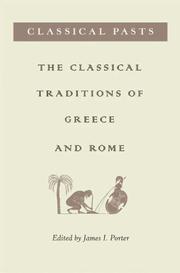| Listing 1 - 5 of 5 |
Sort by
|
Book
ISBN: 9782914777599 2914777590 Year: 2010 Volume: *1 Publisher: Toulouse Anacharsis
Abstract | Keywords | Export | Availability | Bookmark
 Loading...
Loading...Choose an application
- Reference Manager
- EndNote
- RefWorks (Direct export to RefWorks)
Travel --- Historical Narrative --- Near East --- Critical Edition --- La Brocquière, Bertrandon de --- Middle East --- Description and travel
Book
ISBN: 9782745318039 2745318039 Year: 2008 Volume: 8 Publisher: Paris Champion
Abstract | Keywords | Export | Availability | Bookmark
 Loading...
Loading...Choose an application
- Reference Manager
- EndNote
- RefWorks (Direct export to RefWorks)
Princes --- Marshals --- Marshals. --- Princes. --- Historical narrative --- Memories --- 18th-19th centuries --- Europe --- Ligne, Charles Joseph, --- Austria. --- Belgium. --- Europe. --- Royalty --- Courts and courtiers --- De Ligne, Charles Joseph, --- Ligne,
Book
ISBN: 9783110419634 3110419637 9783110422320 3110422328 3110422379 311042231X Year: 2016 Volume: 211 Publisher: Berlin, [Germany] : De Gruyter,
Abstract | Keywords | Export | Availability | Bookmark
 Loading...
Loading...Choose an application
- Reference Manager
- EndNote
- RefWorks (Direct export to RefWorks)
Das theoretische Feld zu fiktionalem und faktualem Erzählen ist in den letzten Jahren unübersichtlich geworden. Die Studie bietet eine kritische Analyse der wichtigsten Positionen. Historisches Erzählen diente im Zuge postmoderner Sprachzweifel oft als Beispiel für den prekären Wirklichkeitsbezug faktualer Erzählungen. Mit Blick auf das fiktionale Erzählen wurden anhand des postmodernen historischen Romans mit Metafiktion und Metahistoriografie Erzählverfahren betont, die sich von einem verlässlichen Wirklichkeitsbezug distanzieren. Die vorliegende Studie rückt neben diesen distanzierenden, illusionsstörenden Techniken wieder solche Erzählverfahren in den Blick, die Geschichte als ,Ereignis' inszenieren. Historisches Erzählen kombiniert den Bezug auf eine vergangene Wirklichkeit immer mit dem Anspruch, eine in sich schlüssige Erzählung zu bilden. Anhand deutschsprachiger und niederländischsprachiger Geschichtserzählungen wird nachgezeichnet, wie sich diese grundlegende Dynamik zwischen glaubwürdigem Wirklichkeitsbezug und glaubwürdiger Erzählwirklichkeit im fiktionalen und im faktualen Zusammenhang je unterschiedlich entfaltet.
Deutsch. --- Niederländisch. --- Literatur. --- Geschichtlichkeit. --- Realitätsbezug. --- (Produktform)Hardback --- (Zielgruppe)Fachpublikum/ Wissenschaft --- historical narrative --- (Produktrabattgruppe)PR: rabattbeschränkt/Bibliothekswerke --- contemporary literature --- Historical novel --- (VLB-WN)1562: Hardcover, Softcover / Sprachwissenschaft, Literaturwissenschaft/Allgemeine und Vergleichende Literaturwissenschaft --- Narration (Rhetoric) --- German fiction --- Dutch fiction --- Prose literature, German --- Prose literature, Dutch --- History. --- History and criticism. --- Dutch literature --- Rhetoric --- Discourse analysis, Narrative --- Narratees (Rhetoric) --- Historical novel. --- contemporary literature. --- historical narrative.
Book
Abstract | Keywords | Export | Availability | Bookmark
 Loading...
Loading...Choose an application
- Reference Manager
- EndNote
- RefWorks (Direct export to RefWorks)

ISBN: 0691089418 0691089426 0691225397 Year: 2006 Publisher: Princeton University Press
Abstract | Keywords | Export | Availability | Bookmark
 Loading...
Loading...Choose an application
- Reference Manager
- EndNote
- RefWorks (Direct export to RefWorks)
The term "classical" is used to describe everything from the poems of Homer to entire periods of Greek and Roman antiquity. But just how did the concept evolve? This collection of essays by leading classics scholars from the United States and Europe challenges the limits of the current understanding of the term. The book seeks not to arrive at a final definition, but rather to provide a cultural history of the concept by exploring how the meanings of "classical" have been created, recreated, and rejected over time. The book asks questions that have been nearly absent from the scholarly literature. Does "classical" refer to a specific period of history or to the artistic products of that time? How has its definition changed? Did those who lived in classical times have some understanding of what the term "classical" has meant? How coherent, consistent, or even justified is the term? The book's introduction provides a generous theoretical and historical overview. It is followed by eleven chapters in which the contributors argue for the existence not of a single classical past, but of multiple, competing classical pasts. The essays address a broad range of topics--Homer and early Greek poetry and music, Isocrate, Hellenistic and Roman art, Cicero and Greek philosophy, the history of Latin literature, imperial Greek literature, and more. The most up-to-date and challenging treatment of the topic available, this collection will be of lasting interest to students and scholars of ancient and modern literature, art, and cultural history.
Beschaving [Grieks-Romeinse ] --- Civilisation gréco-romaine --- Civilization [Greco-Roman ] --- Cultuur [Grieks-Romeinse ] --- Greco-Roman civilization --- Grieks-Romeinse beschaving --- Grieks-Romeinse cultuur --- Civilization, Greco-Roman. --- Civilization, Greco-Roman --- Civilization, Classical --- klasszika-filológia --- klasszikus irodalom --- művészettörténet --- tanulmányok --- Academy. --- Achaemenids. --- Acusilaus of Argos. --- Alcamenes. --- Antinoopolis. --- Athenocentrism. --- Bacchylides. --- Boeotia. --- Bronze Age. --- Caecilius. --- Callimachus. --- Cato. --- Corinthian classicism. --- Dionysius. --- Domitian. --- Empedocles. --- Ennius. --- Epicureanism. --- Gorgias. --- Hadrian. --- Hellenism. --- Hera Teleia. --- Horace. --- Italic art. --- Jesus. --- Jupiter Dolichenus. --- Justinian. --- Laevius. --- Latin. --- Livius Andronicus. --- Lucian. --- Lycurgus. --- Lysias. --- Maecenas. --- Martial. --- Oppian. --- Osiris. --- classicus. --- cultural memory. --- democracy. --- emotion. --- euphonism. --- historical distance. --- historical narrative. --- humanism. --- ideology. --- imperialism. --- modernity. --- monuments. --- mythography. --- naturalism. --- neoteric literature. --- orality. --- oratory.
| Listing 1 - 5 of 5 |
Sort by
|

 Search
Search Feedback
Feedback About UniCat
About UniCat  Help
Help News
News